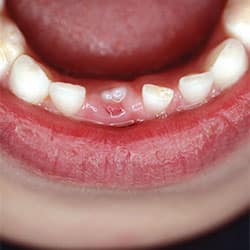New Reference Values for Developing Dentition
Children’s teeth don’t develop along the traditionally accepted timeline, according to a study from the University of Missouri School of Medicine.
 Children’s teeth don’t develop along the traditionally accepted timeline, according to a study from the University of Missouri School of Medicine. Appearing in The Anatomical Record: Advances in Integrative Anatomy and Evolutionary Biology, the research expands on the 14-stage system published by Moorees et al in 1963 by providing updated standards for development of the mandibular dentition. The paper, “Timing of Development of the Permanent Mandibular Dentition: New Reference Values from the Fels Longitudinal Study,” clarifies the understanding of normal development, which makes it easier to identify cases that are abnormal and in need of treatment.
Children’s teeth don’t develop along the traditionally accepted timeline, according to a study from the University of Missouri School of Medicine. Appearing in The Anatomical Record: Advances in Integrative Anatomy and Evolutionary Biology, the research expands on the 14-stage system published by Moorees et al in 1963 by providing updated standards for development of the mandibular dentition. The paper, “Timing of Development of the Permanent Mandibular Dentition: New Reference Values from the Fels Longitudinal Study,” clarifies the understanding of normal development, which makes it easier to identify cases that are abnormal and in need of treatment.
Investigators used data from more than 6,000 serial radiographs from 590 children in the Fels Longitudinal Study, recorded between 1940 and 1982. Craniofacial researchers evaluated radiographs of canine and post-canine teeth to determine the precise beginning and end of each tooth’s growth process. After accounting for variability in tooth maturation, the researchers developed a clinically useful reference guide with more accurate results than the previous system. Clinicians can use the guide in pediatric oral examinations to ensure teeth are developing appropriately, and in the appropriate sequence.
In addition, this methodology should allow oral health professionals and forensic pathologists to more accurately estimate a subject’s age based on the stages of tooth development.
From Dimensions of Dental Hygiene. December 2019;17(11):10.

